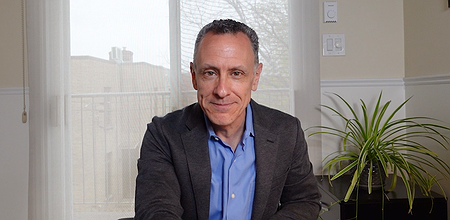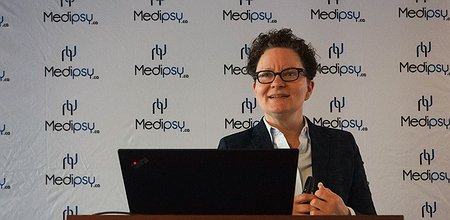A theoretical course illustrated with clinical examples. This course is composed of videos of 5 to 15 minutes each. The PowerPoint of the course to download.
Introduction to Cognitive Behavioural Therapy for Psychosis
Dr. Michael Best, Psychologist
Psychosis is one of the most serious and persistent mental health conditions. In order to effectively treat individuals experiencing psychosis, clinicians must be able to discuss psychotic symptoms in a normalized and recovery-oriented manner.
Excerpt:
- 3h of continuing education
- 21 lessons that last from 5 to 15 minutes each
- 1 certificate of achievement
- 1 PowerPoint
- 1 bibliography
- 1 course evaluation
- 4 months unlimited access
- 7-day money back guarantee
- 94% of participants who completed the satisfaction survey declare they would recommend this course to a colleague
Overview
Cognitive behavioural therapy for psychosis (CBTp), a specific adaptation of cognitive behavioural therapy, is designed to treat symptoms of psychosis and support recovery. CBTp is a treatment plan based on the cognitive model of psychosis that clinicians need to employ for better outcomes with their patients. This workshop aims to provide an introductory overview of CBTp by reviewing psychosis and its symptoms, as well as different recovery-focused approaches and evidence for CBTp. Dr Best will also discuss CBTp training, intervention protocols, the five treatment phases and CBTp session structure. Additionally, the workshop will cover conceptualization and treatment of psychosis with regards to cognitive formulations, hallucinations, and “delusions”.
About the expert

Dr. Michael Best is a clinical psychologist and Assistant Professor in the Graduate Department of Psychological Clinical Science at the University of Toronto, Affiliate Scientist at Ontario Shores Center for Mental Health Sciences, and Collaborator Scientist at the Centre for Addiction and Mental Health. Dr. Best’s research focuses on cognitive mechanisms underlying experiences of psychosis and innovating cognitive behavioural therapies for psychosis. He has co-developed a novel cognitive treatment for internalized stigma, called BOOST, that focuses on helping people with a first episode of psychosis overcome internalized stigma. He has also conducted clinical trials of remotely delivered CBT for psychosis, and examined mechanisms of change during CBTp. Dr. Best is a member of the steering committee for the North American CBTp Network and an executive officer for the Canadian Association for Cognitive and Behavioural Therapies.
Learning objectives
- Define the symptoms of psychosis
- Articulate the structure of CBT for psychosis
- Conceptualize hallucinations and ‘delusions’ using the cognitive model of psychosis
- Identify appropriate cognitive and behavioural change strategies for psychosis
Learning material
Syllabus
- PowerPoint
-
Symptoms of psychosis
- 1. Presentation
- 2. Basics of hallucinations
- 3. Basics of delusions
- 4. Psychotic disorders
- 5. Recovery
-
Evidence for CBT for Psychosis
- 6. The psychosis continuum and cultural context
- 7. Evidence based studies about CBT and psychosis
- 8. Conceptualization-Driven CBTp
- 9. CBT protocol
- 10. CBTp Values
- 11. Tips for Ethical - Competent CBTp
- 12. Phases of treatment
- 13. Session structure
-
Cognitive conceptualization of Psychosis
- 14. Cognitive change strategies
- 15. Behavioral change strategies
- 16. Cognitive model of hallucinations
- 17. Coping strategies for voices
- 18. The example of Sally- voices hallucinations
- 19. Analysis of delusions
- 20. Case formulation video
- 21. Conclusion
- Bibliography
CE Credits
Download a certificate of successful completion.
Audience
This training is intended for mental health professionals.
Registration
Ask a question
Do you have a question? Then email us at contact@asadis.net
Frequently asked questions
-
How long do I have access to the course?
After your registration, the course is accessible anytime and from anywhere for 124 days.
-
When does the course start?
That is entirely up to you! When you buy a course, you'll receive an access link that you can activate when you want.
-
Is there a student rate?
Yes there is! To learn more, email us at contact@asadis.net.
You may also be interested in:
Legal notice
The courses offered by ASADIS are accredited by different professional organisations. In addition, ASADIS is approved by the Canadian Psychological Association to offer continuing education for psychologists. ASADIS maintains responsibility for the program.
The CPA’s approval of an individual, group, or organization as a CE Sponsor or Provider is restricted to the activities described in the approved application or annual report form. The CPA’s approval does not extend to any other CE activity the Sponsor or Provider might offer. In granting its approval, the CPA assumes no legal or financial obligations to Sponsors, Providers, or to those individuals who might participate in a Sponsor or Provider’s CE activities or programs. Further, responsibility for the content, provision, and delivery of any CE activity approved by the CPA remains that of the CE Sponsor or Provider. The CPA disclaims all legal liability associated with the content, provision, and delivery of the approved CE activity.





